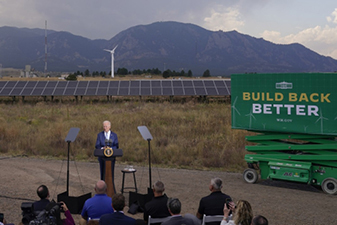|
By Cecile Entleitner, Associate, Blakey & Agnew
In early August, the Senate passed the Infrastructure Investment and Jobs Act (IIJA) in a bipartisan 69-30 vote. The $1.2 trillion bill incorporates a five-year surface transportation authorization as well as approximately $550 billion in new direct appropriations above current baseline levels for investments in infrastructure programs, including freight and passenger transportation, water provisions, electric grid and energy infrastructure, and broadband. Of this total, the U.S. Department of Transportation would receive nearly $568 billion over five years, which represents an increase of roughly $274 billion above current funding levels. The IIJA was subsequently sent to the House where it awaits a final vote.
Congressional Democrats swiftly moved on to their next order of business: developing a $3.5 trillion "human infrastructure" bill. This legislation will incorporate various Democratic priorities, such as health care, education, and climate considerations. The House briefly interrupted the summer recess to advance their budget resolution, a blueprint that serves as the first step in the budget reconciliation process. Budget reconciliation measures follow different procedural rules than legislation considered under regular order, allowing the Senate to pass a bill by a simple majority, thereby preventing a potential filibuster.
Despite opposition from Republicans and moderate Democrats, House Speaker Pelosi (D-CA) has repeatedly maintained that the House would not hold its final vote on the IIJA until the reconciliation package passes the Senate. Due to the narrow majority Democrats hold in the House, both bills require widespread support within the caucus to ensure passage. In an effort to appease moderates (who have called for an immediate vote on the IIJA) and progressives (who contend the reconciliation bill must be passed first), the House adopted a resolution setting a September 27 deadline for the IIJA vote – days before the current surface transportation authorization expires on September 30. However, if the Senate does not pass the budget reconciliation bill by September 27, there remains a possibility that some progressive Democrats may withhold support for the IIJA. If House leadership believes the IIJA will not receive sufficient support for passage, a simple majority of 215 Members could then agree to further postpone the vote on the IIJA.
In September, House committees began drafting their sections of the reconciliation bill, titled the Build Back Better Act. The House Committee on Transportation and Infrastructure (T&I) held a 15-hour hearing on September 14 to consider their portion of the legislation, which would provide nearly $60 billion over the next 10 years. Additionally, the Energy and Commerce Committee markup includes $26 billion for electric vehicles and charging infrastructure and the Ways and Means Committee title would provide over $360 billion in infrastructure
|

and green energy tax incentives. Per an agreement with the White House on "double-dipping," committees were instructed to refrain from adding funding in the reconciliation bill for programs included in the IIJA. The transportation-related provisions of the Build Back Better Act are mostly focused on emissions reduction, electrification, resiliency, and other environmental improvements.
The T&I markup provides $2.5 billion in grant funding to the Maritime Administration for projects to support supply chain resilience, reduction in port congestion, and environmental remediation. The Federal Highway Administration would receive $4 billion to award grants for carbon reduction and zero-emission transportation projects. The legislation includes $150 billion for credit risk premium assistance under the Railroad Rehabilitation Infrastructure and Financing loan program, of which at least half must go toward publicly owned or operated passenger rail projects and at least 25 percent to Class II and III freight railroads. Lawmakers also incorporated $6 billion for earmarked highway and transit projects, which were included in the original House-passed reauthorization proposal but subsequently left out of the IIJA. Additionally, the Energy and Commerce draft establishes several new grant, rebate, and loan programs to support zero-emission heavy-duty vehicles and related charging infrastructure, zero-emissions port equipment and technology, and other transportation electrification initiatives. The Ways & Means Committee section consists of various tax credit provisions and other financing incentives, including a new Qualified Infrastructure Bonds program, advance refunding bonds, and a tax credit for commercial electric vehicles.
Once the Build Back Better Act passes the House, it will proceed to the Senate for consideration. Due to the Senate's stringent rules regarding which provisions may be included in budget reconciliation measures and its unlimited amendment process, known as a vote-a-rama, the legislation will likely undergo quite a few changes before final passage. With several important funding deadlines looming at the end of September, Congress will be under significant pressure in the coming weeks as lawmakers work diligently to send both the Build Back Better Act and IIJA to the President's desk.
Blakey & Agnew, LLC is a public affairs and
communications consulting firm based in
Washington, DC.
|


